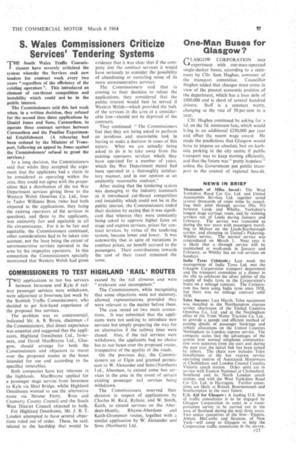S. Wales Commissioners Criticize Services' Tendering Systems
Page 59

If you've noticed an error in this article please click here to report it so we can fix it.
THE South Wales Traffic Commis1 sinners have severely criticized the system whereby the Services seek new tenders for contract work every two years "regardless of the efficiency of the existing operators ". This introduced an element of cut-throat competition and instability which could not be in the public interest.
The Commissioners said this last week% when, in a written decision, they refused for the second time three applications by Daniel Jones and Sons, Carmarthen, to operate three contract services between Carmarthen and the Peridine Experimental Establishment. (A rehearing had been ordered by the Minister of Transport, following an appeal by Jones against the Commissioners' refusal to grant the services.) In a long decision, the Commissioners said that whilst they accepted the argument that the applicants had a claim to be considered as operating within the area, they could not agree with the proposition that a distribution of the ten War Department services giving three to the Western Welsh Omnibus Co. Ltd., four to Tudor Williams Bros. (who had both objected to the applications, they being the existing operators of the services in question), and three to the applicants, was eminently fair and equitable in all the circumstances. For it to he fair and equitable, the Commissioners continued, other considerations had to be taken into account, not the least being the extent of unremunerative services operated in the area by the respective operators. In this connection the Commissioners specially mentioned that Western Welsh had given evidence that it was clear that if the company lost the contract services it would have seriously to consider the possibility of abandoning or curtailing Some of its more unremunerative services.
The Commissioners said that in . coming to their decision to refuse the applications, they considered that the public interest would best be served if Western Welsh—which provided the bulk of the services in the area at a considerable loss—should not be deprived of the contracts.
They continued: "The Commissioners feel that they are being asked to perform an invidious and unenviable task in having to make a decision in cases of this nature. What we are actually being asked to do is to take away from the existing operators services which they have operated for a number of years, which the War Department stated had been operated in a thoroughly satisfactory manner, and in our opinion at an eminently reasonable contract."
After stating that the tendering system was damaging to the industry inasmuch as it introduced cut-throat competition and instability which could not be in the public interest, the Commissioners ended their decision by saying that it was significant that whereas they were constantly being asked to approve higher fares on stage and express services, prices for contract services, by virtue of the tendering system, became lower and lower. It was noteworthy that in spite of variations in contract prices, no benefit accrued to the passengers. Their contributions towards the cost of their travel remained the same.




































































































































































